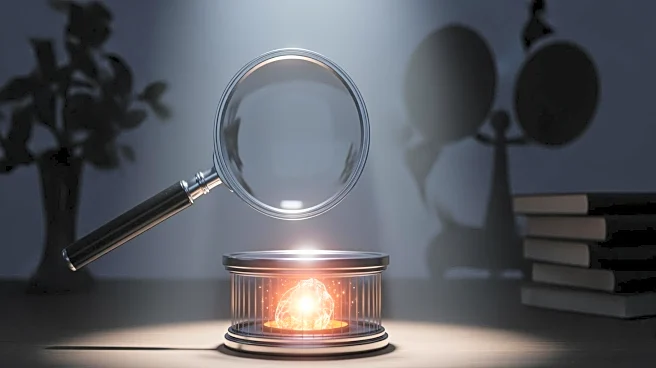What's Happening?
The International Atomic Energy Agency (IAEA) has been unable to verify the status of Iran's near weapons-grade uranium stockpile since a conflict involving Israel in June. A confidential report by the United Nations' nuclear watchdog, seen by the Associated
Press, highlights the urgent need to address the status of this material. Iran's stockpile, enriched up to 60% purity, could potentially allow the country to build up to 10 nuclear bombs if weaponized, although Iran insists its program is peaceful. The IAEA has called for a 'special report' from Iran detailing the location and status of its nuclear material, as required by their safeguards agreement. Iran suspended cooperation with the IAEA following the conflict but allowed inspections of undamaged facilities after an agreement in September. However, subsequent U.N. sanctions led Iran to halt the implementation of this agreement.
Why It's Important?
The inability of the IAEA to verify Iran's uranium stockpile raises significant concerns about nuclear proliferation and regional security. The situation underscores the fragile state of international nuclear agreements and the potential for escalation in the Middle East. The stockpile's potential to be weaponized poses a threat to global security, particularly if diplomatic efforts fail to ensure transparency and compliance. The reimposition of U.N. sanctions and Iran's suspension of cooperation with the IAEA could further strain relations with Western nations and complicate efforts to negotiate a peaceful resolution. The situation impacts U.S. foreign policy, as it navigates alliances and tensions in the region, and could influence global nuclear policy discussions.
What's Next?
The international community, particularly European powers, may continue to push for Iran's compliance with the IAEA's requirements and the Treaty on the Non-Proliferation of Nuclear Weapons. Diplomatic efforts may focus on resuming direct talks between Iran and the U.S. to address the uranium stockpile issue and restore cooperation with the IAEA. The situation could lead to further sanctions or diplomatic measures if Iran remains uncooperative. Stakeholders, including political leaders and international organizations, will likely monitor developments closely, seeking to prevent further escalation and ensure regional stability.
Beyond the Headlines
The ongoing tensions between Iran and Western nations highlight broader issues of trust and verification in international nuclear agreements. The situation may prompt discussions on the effectiveness of current non-proliferation treaties and the need for stronger mechanisms to ensure compliance. The geopolitical dynamics in the Middle East, influenced by historical conflicts and alliances, add complexity to resolving the issue. The ethical implications of nuclear proliferation and the potential humanitarian impact of conflict underscore the importance of diplomatic solutions.















